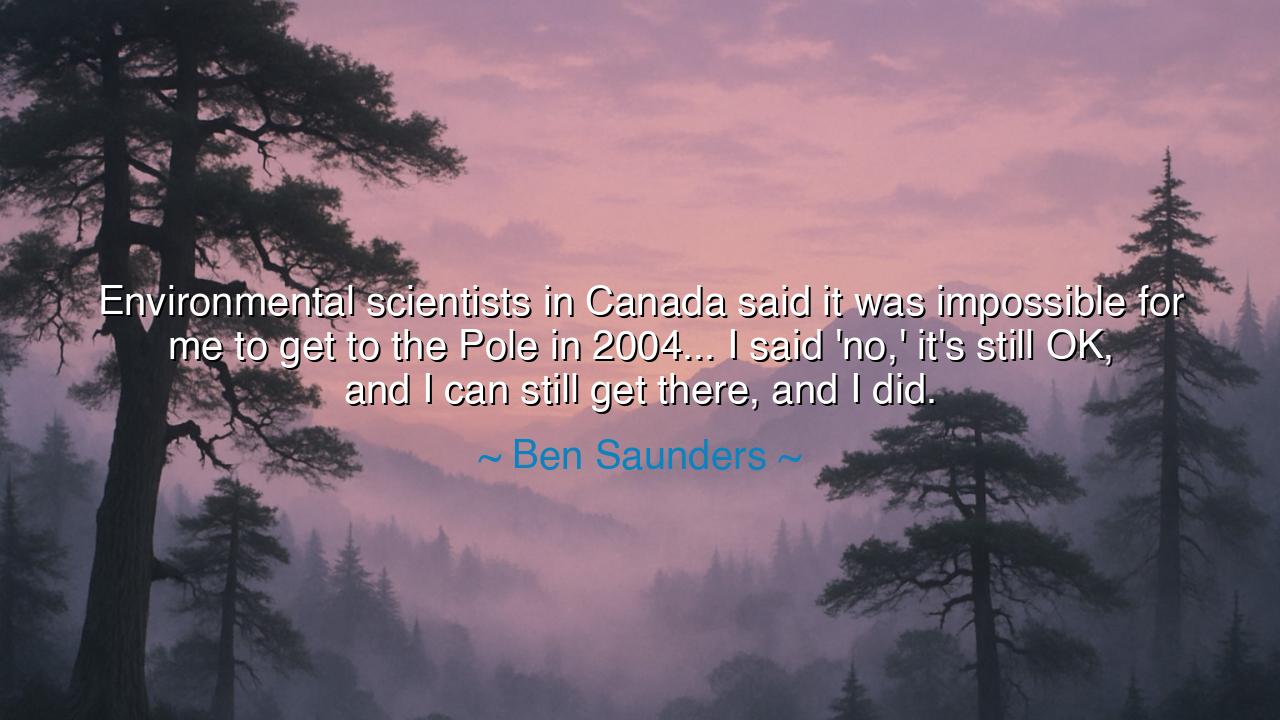
Environmental scientists in Canada said it was impossible for me
Environmental scientists in Canada said it was impossible for me to get to the Pole in 2004... I said 'no,' it's still OK, and I can still get there, and I did.






Hear, O seeker of courage, the words of Ben Saunders, polar explorer and man of iron will, who declared: “Environmental scientists in Canada said it was impossible for me to get to the Pole in 2004… I said ‘no,’ it’s still OK, and I can still get there, and I did.” In this cry echoes the eternal defiance of the human spirit, which rises up against the cold hand of impossibility and carves a path where none was thought to exist. His words are not only about snow and ice, but about the essence of endurance, belief, and the daring heart.
The meaning of this teaching lies in the tension between impossibility and determination. The scientists were not foolish; their warnings were born of reason, calculation, and wisdom of the environment. They saw the obstacles—cracking ice, bitter winds, shifting floes—and declared the path closed. Yet Saunders, hearing their judgment, refused to let it chain his spirit. He answered not with contempt but with conviction: that sometimes, what the world calls impossible is merely the unattempted, waiting for a heart bold enough to claim it.
History gives us many such tales. Consider Ernest Shackleton, who in 1914 set forth upon the Endurance to cross Antarctica. His expedition collapsed when his ship was trapped and crushed by ice. Yet though he did not achieve his aim, his leadership and refusal to surrender saved the lives of his men. Where others saw death, Shackleton’s unyielding will forged survival. So too with Saunders: though the obstacles loomed, his resolve carried him forward, proving that limits are often gates to be pushed open by courage.
Mark this well, O listener: there is a sacred balance between wisdom and daring. To ignore knowledge is folly, yet to bow too quickly to predictions of defeat is cowardice. Saunders teaches us that belief is itself a kind of power, one that can transform the harshest landscape into a path. His journey to the Pole in 2004 was not merely an expedition—it was a living testament that the human will, when fused with preparation and resilience, can achieve what reason alone may doubt.
The lesson is not to scorn science, for it gives us truth and guidance. But truth does not always measure the fire of the human soul. Equations may calculate distances and risks, but they cannot measure faith, endurance, or the determination to take one more step when all strength seems spent. Saunders showed the world that impossibility can be overcome not by denial of reality, but by refusal to surrender to despair.
Let this be the guidance for your own life: when voices around you whisper that your dream cannot be achieved, do not let their certainty extinguish your flame. Listen to their wisdom, yes, but weigh it against the strength of your heart. Prepare yourself with knowledge, but march forward with courage. For every great achievement in history—from voyages across unknown seas to the conquest of disease—was once declared impossible by wise and cautious men.
Therefore, O child of tomorrow, let Saunders’ words be your beacon. Stand firm in the face of impossibility. Say, as he said, “no—it’s still OK, I can still get there.” And then go, step by step, until the frozen wastes of doubt give way to the triumph of your own endurance.
Thus, his words remain as a torch for generations: that the limits of the world are not always the limits of the soul, and that sometimes, to prove it, one must walk into the impossible and return victorious.






AAdministratorAdministrator
Welcome, honored guests. Please leave a comment, we will respond soon